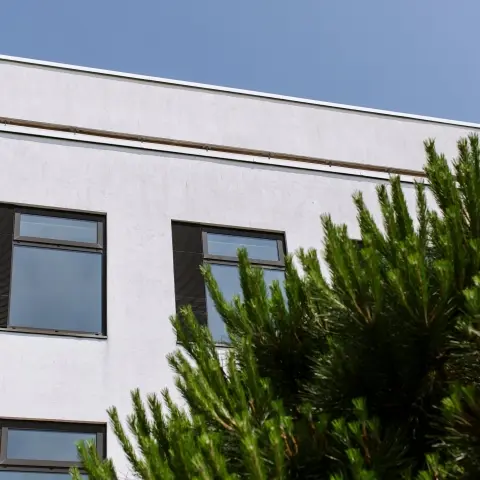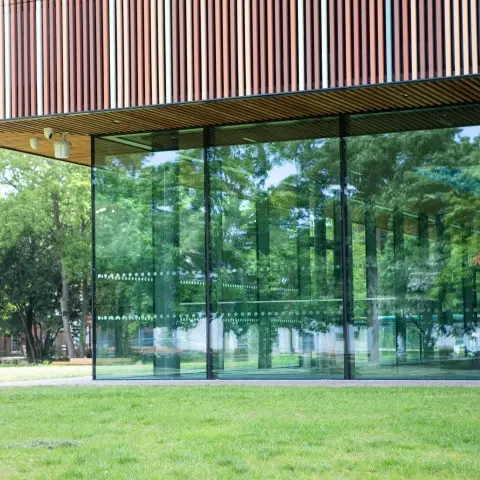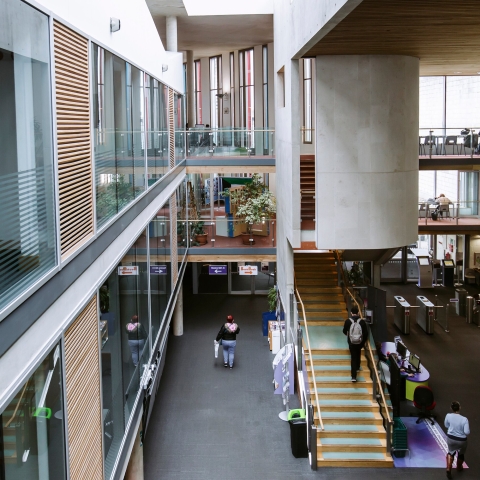

Understanding the Student Conduct Policy
Understand your responsibilities and rights and help to create a safe environment for everyone.
As a student member of our university community, you play an essential role in upholding the values that contribute to a safe, inclusive, and engaging learning environment for everyone.
The Student Conduct Policy outlines what we expect from you in terms of behaviour, both in and out of class, and explains how we deal with any breaches of the policy.
You’ll find information here on:
- Getting advice
- Raising a concern about conduct
- What happens if your behaviour is investigated
Introducing the Student Conduct Policy to students
The University Student Conduct Policy helps us all to make sure every student can learn and grow in an environment that safe, supportive and inclusive.
It helps staff to apply disciplinary processes fairly, transparently and consistently whether they're exploring academic misconduct like plagiarism or disruptive behaviour.
The policy is based on eight principles.
Immediate safety and safeguarding for any student who's experienced harm.
Compassionate and appropriate support for all affected students.
Protecting dignity by recording and acknowledging experiences of harm.
Respect for the autonomy and informed choice of harmed students.
Ensuring fairness by hearing and respecting students being investigated.
Facilitating practical measures for restorative conflict resolution.
Making sure those who are found to have caused harm take accountability.
And ensuring outcomes include measures for education and community building.
To find out more about how we create a positive and welcoming community where every student can thrive, take a closer look at the Student Conduct Policy.
Read the Student Conduct Policy
What is covered by the Policy?
The policy addresses a wide range of conduct issues to promote integrity, respect, and fairness across our university community. It applies to both on-campus and off-campus behaviour, starting from the moment you accept your place at the University. Here’s what it includes:
Unacceptable Behaviour
Unacceptable Behaviour is behaviour that could be reasonably perceived to cause upset, distress or harm to another person or an organisation.
Here are some examples of unacceptable behaviour (this is not an exhaustive list):
- Antisocial behaviour or the active promotion of antisocial behaviour;
- Inappropriate, abusive or threatening behaviour, including on social media;
- Compromising the safety of and/or wellbeing of staff, other students, or visitors, or causing a health and safety concern. This may include failure to follow the safety guidelines relevant to the sport or activity;
- Sexual misconduct;
- Violence, harassment and hate crimes/speech;
-
Failure to act in compliance with the Dignity and Respect Policy, including discrimination/harassment based on someone’s age, disability, gender reassignment, gender identity, marital status, pregnancy, race, religion or belief, sex or sexual orientation;
-
Behaviour likely to bring the University into disrepute, such as disruptive behaviour in the community;
-
Internet access abuse, such as visiting inappropriate websites, uploading/ downloading inappropriate content, and propagation of computer viruses;
-
Disruptive behaviour on the University’s premises, such as setting off fire alarms or obstructing access to buildings or rooms;
-
Damage to or deliberate misuse of the University’s property or abuse of its facilities;
-
Relying on forged, falsified or fraudulent documentation, and other forms of deception that are intended to gain an advantage, for example, submitting fraudulent extenuating circumstances claims or falsifying evidence in support of extenuating circumstances claims (this may also be considered an academic disciplinary matter);
-
Persistently contacting someone against their wishes;
-
Not declaring a criminal charge/conviction when required to do so;
-
Arranging or participating in initiation/hazing activities in relation to sporting or social activities;
-
Substance misuse (including during sporting or social activities) or breach of policy related to the possession of illegal drugs for personal use.
-
Other behaviour which may also constitute a criminal offence.
As defined by the University’s Sexual Misconduct Policy, sexual misconduct is defined as any unwanted conduct of a sexual nature.
Sexual misconduct can occur:
• In person, by letter, telephone, text, email or other electronic means and/or social media;
• Between individuals of any gender identity or sexual orientation;
• By someone known to the victim or by a stranger;
• In any location on or off campus.
We will actively respond to all reports of sexual misconduct and will respect the rights of the individual reporting an incident to choose how to take the matter forward.
We believe that no person should experience the effects of sexual misconduct alone and will ensure that there is dedicated specialist support for all individuals involved. Further details can be found in the Sexual Misconduct Policy.
The University upholds both the principles of academic freedom and inclusion. While the University encourages respectful and informed approaches to diverse topics, academic staff retain the right to present evidence-based research, theories, and scholarly viewpoints on all subjects, including those related to protected characteristics under the Equality Act 2010 (Protected academic expression). Course content should aim to represent diverse perspectives while preserving the academic freedom to explore challenging or contested topics through rigorous scholarly discourse. Where potential tensions may arise between creating inclusive environments and protecting freedom of expression, the University will seek to enable both by focusing on the manner of expression rather than restricting legitimate content. The University is committed to facilitating difficult conversations while ensuring respect for all community members.
We recognise that many issues can be resolved using an informal and restorative approach, and we will seek an early resolution where this is appropriate and agreed by those involved. The University will also provide those involved with guidance and support.
If it is determined that the issue cannot be resolved informally, your case may be referred for a formal investigation.
What is not covered by the Policy?
If you have a concern about the conduct of a member of staff, you should make a student complaint instead of submitting a conduct complaint.
If you are affected by unacceptable behaviour during your studies, but the person causing the concern is not a member of the University community, the University cannot use the Student Conduct Policy, but can still offer you support (see below).
The contractual obligations of students living in halls of residence are set out in the Halls of Residence Handbook. Initially, all matters are dealt with by a Breach of Hall Regulations interview with the Head of Residential Services and/or Residence Life Manager or nominated representative(s). Misconduct in halls of residence will be escalated to this Policy if the matter is sufficiently serious or repeated as to be a breach of this Policy.
Reporting an incident to the University
All misconduct reports are taken seriously and anyone, including non-University community members, may raise concerns. To report an incident:
- Use Report + Support and select the option to be contacted by an advisor;
- Report to any staff member or the Students' Union, who will complete the Report + Support form.
- Complaints relating to Team UoP activities may be raised within Sport & Recreation, who will notify the Student Casework team before initiating the Precautionary Measures process.
Following receipt of the report, Student Life will contact the reporting individual to advise them of the welfare and support options available and reporting options, including a complaint under this Policy.
Student Life (or other support service) will pass confirmed complaints to the Student Casework team to initiate the Precautionary Measures process and then take further action under this Policy.
Supporting you
We are committed to supporting both the reporting party and the reported party equally throughout the process. We understand that these situations can be challenging for everyone involved, and we are here to ensure that all parties are treated with care and respect and receive fair treatment, guidance and support.
Both reporting and reported students have rights to:
- Confidential advice and resources;
- Fair treatment and respect;
- Support services;
- Clear information about the process.
Our goal is to create a balanced, respectful approach where both sides are supported, and the process is handled with care and dignity.
Our Student Success Officers (specific to your Faculty) and the Student Life team (studentlife@port.ac.uk) are also available to provide practical and emotional support throughout the student conduct process and can refer and signpost you to other internal and external support services. The Student Life team are trained Sexual Violence Liaison Officers (SVLOs), meaning that they have specialist training to enable them to support students who have experienced sexual misconduct.
We recognise that students may need specific support to be able to have a fair hearing due to aspects of their identity. We are committed to supporting all students to engage with the Student Conduct Policy and can signpost to additional sources of support where relevant to their individual needs.
What happens when a concern is raised?
When a concern is raised, whether related to academic misconduct or behavioural issues, we follow a clear and structured process to ensure fair and thorough handling of the situation.
Here’s an overview of the steps involved:
We believe many issues can be resolved quickly and informally at an early stage (usually within 10 to 20 working days).
The University offers a restorative informal approach, which is often sufficient to resolve the matter without the need for more formal means.
If an informal resolution is appropriate, an Authorised Person will be appointed by either the Head (or equivalent) of the School or Professional Service or the Student Casework team to discuss the matter with both the reported student and the reporting party and to make a record of the discussion and outcome. Options for informal resolution may include:
- Facilitating a meeting or mediation;
- Contacting the student on the person's behalf to explain the concerns;
- Requesting that certain unwanted behaviours or contact not be repeated, or;
- Facilitating supportive measures for the person concerned to reduce future contact.
Informal resolution is always undertaken in good faith, to foster good community relations, and is not based on any assumption about whether or not misconduct has occurred. Any intervention does not represent a decision by the University about any potential misconduct, nor apportion blame.
If the matter is resolved at this stage, there is no further action required. This will be communicated via email to the reported student and reporting party by the Authorised Person. If this is not the case, then the matter will proceed to formal investigation.
If Early Resolution fails or is not appropriate, the next step is an investigation (which is usually completed within 30 working days).
During this phase, an investigator with no previous involvement will gather evidence, including statements from both parties and any relevant witnesses. Both sides will have an opportunity to share their perspectives, and the investigation will be conducted fairly, with respect for everyone’s rights.
The possible outcomes of the investigation include:
- The student has not been considered to be in breach of the Policy and the matter will be closed;
- The student has been considered to be in breach of the Policy and the matter can be resolved at this stage with the imposition of a minor or moderate sanction;
- There is a case to answer for a breach of the Policy and a Panel should be convened to consider if a major sanction is appropriate.
If either of the first two outcomes occur, there will be no further action after any sanctions are implemented. If a Panel is requested, the Student Casework team will convene a Panel (see below)
A Panel is required where there is evidence of a serious or repeated breach of the Policy such that a major sanction should be considered. The panel consists of independent University staff who will carefully review all the information from the investigation stage and then make a decision on the appropriate outcome, which may include:
- Suspension or exclusion from the university.
- Exclusion from accessing specific university premises and services.
The reported student is invited to attend the Panel meeting and explain their perspective.
Following the Panel meeting, the University will issue a written outcome explaining the student’s right to appeal the decision.
The reporting party will also receive details of the outcome.
The reported student has the right to appeal the outcome of the case, within 10 working days of receiving the outcome.
The grounds for appeal are as follows:
i. There has been a procedural irregularity in the conduct of the disciplinary process;
ii. New material evidence is available which was not previously reasonably available;
iii. The decision made was unreasonable and/or the sanction imposed was disproportionate to the disciplinary offence.
If your appeal doesn't fit these reasons, the University will likely treat it as a complaint instead.
The Student Casework team will advise you (usually within 10 working days) if there are grounds to convene an appeal Panel. At the end of the Appeal stage, the University will issue a Completion of Procedures letter.
The reporting party does not have the right to appeal the outcome of the case, although reporting students have the right to complain to the University about the way the case was handled, under the Student Complaints Procedure.
If you feel your appeal has not been properly handled, you can apply to an independent body, once the University has issued the Completion of Procedures letter. The Office of the Independent Adjudicator (OIA) handles individual complaints once a student has exhausted the internal procedures of their university.
Precautionary measures
The safety and well-being of all students is our top priority. In some situations, we may need to take immediate precautionary measures to protect everyone involved while the process is ongoing. These measures are not about assigning blame but ensuring a safe and supportive environment for all parties:
Examples of safeguarding measures include:
- Temporary adjustments: Changes to schedules, class attendance, or living arrangements to minimise contact between the parties
- No-Contact Agreement: A formal agreement to prevent communications and contact between the reporting and reported parties
- Interim Suspension: In some circumstances, it may be necessary for a temporary suspension to be put in place to ensure safety, pending the outcome of the investigation and review panel.
These steps, and similar ones, are taken to ensure that both the reporting and reported parties feel safe and supported throughout the process. Safeguarding measures are applied fairly and reviewed regularly as the case progresses.
In an emergency
If you or someone else is in immediate danger, call 999. If you are able, try to find a safe location and someone nearby who may be able to assist you.
If you are experiencing a mental health crisis or need urgent medical or emotional support, please see our Urgent support page.
Additional Resource Links
You will find here some useful related links to University policies and guides
Report and Support

Student charter and graduate hallmarks

Research Misconduct Procedure

Academic appeals

Student complaints

Sexual Misconduct Procedure






